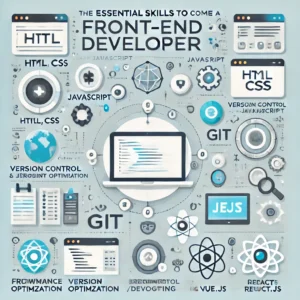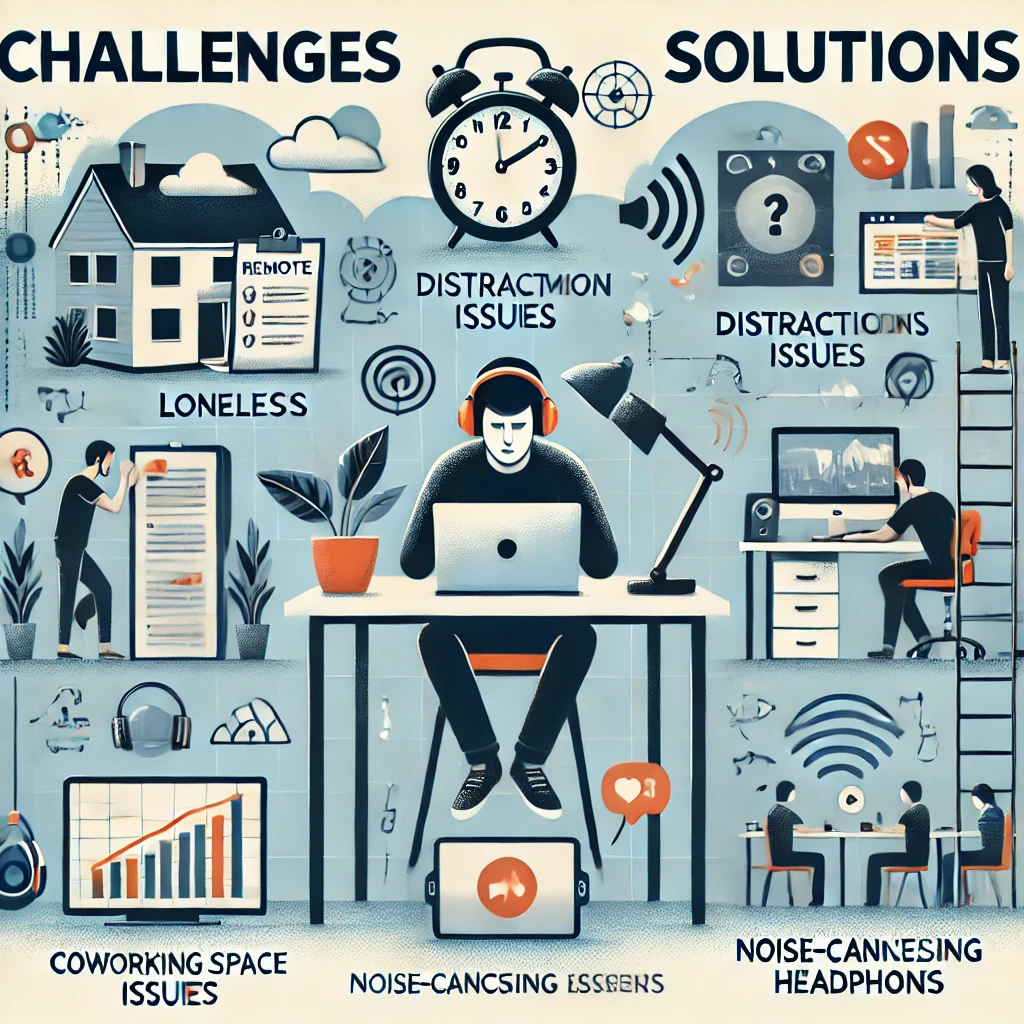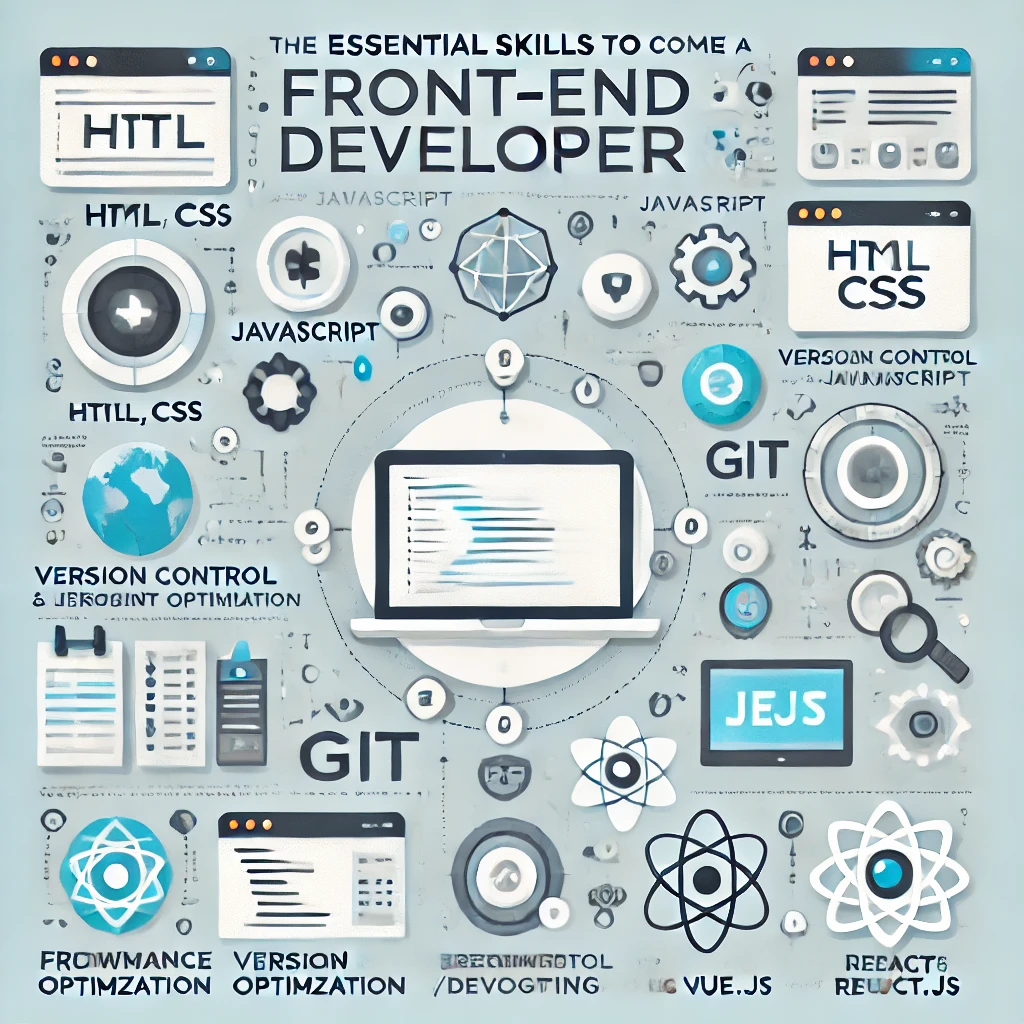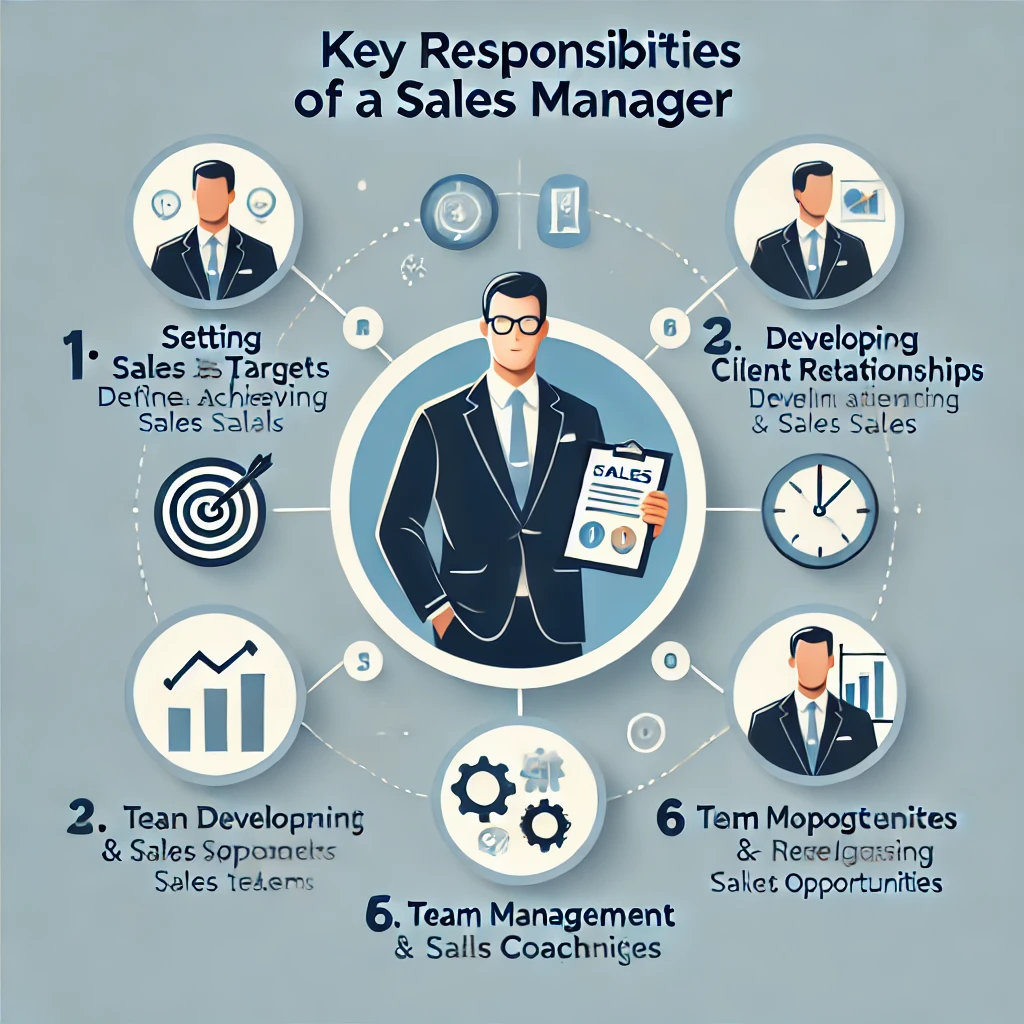Essential Skills Required to Become a Front-End Developer– A Front-End Developer is a professional who builds the visual and interactive elements of a website or web application. They focus on everything that users see and interact with, including buttons, forms, animations, and layouts. Using programming languages like HTML, CSS, and JavaScript, Front-End Developers ensure a website is visually appealing, user-friendly, and functions seamlessly across different devices and browsers.
Front-End Developer is creative, detail-oriented, and skilled in problem-solving. They combine technical expertise with design principles to create websites that are not only functional but also engaging.
Essential Skills Required to Become a Front-End Developer

Reasons for Becoming a Front-End Developer.
Front-end development is one of the most exciting and rewarding careers in the tech industry today. Every website or web application you see on the internet has been built by Front-End Developers. They create the parts of a website that users see and interact with, making sure everything looks good and works smoothly. Here are some of the top reasons why becoming a Front-End Developer is a great career choice:
1. High Demand for Front-End Developers.
Companies in almost every industry need websites and web applications. From small startups to big tech companies, businesses rely on Front-End Developers to create user-friendly and attractive web experiences. Because of this, there is always a high demand for skilled Front-End Developers.
Many companies struggle to find enough qualified developers to fill their job openings. This means that learning Front-End Development can open the door to many job opportunities worldwide. Whether you want to work for a company, a digital agency, or as a freelancer, there are plenty of options available.
2. Good Salary and Career Growth.
Front-end development is a well-paying career. Even beginners can earn a competitive salary, and as you gain experience, your earnings increase.
Tech hubs like San Francisco, New York, and London offer higher salaries, but many companies also allow remote work, meaning you can earn well from anywhere. As a Front-End Developer, you also have room for career growth. With more experience, you can become a Senior Developer, UI/UX Designer, Full-Stack Developer, or even a Software Engineer. The career path is flexible, and you can choose to specialize in areas that interest you.
3. Flexibility and Remote Work Opportunities.
One of the best things about being a Front-End Developer is the flexibility. Many developers work remotely from home or anywhere in the world. As long as you have a laptop and an internet connection, you can work from different locations.
Front-end developers can also choose to work as freelancers, taking on projects from different clients. This allows for even more freedom, as you can set your own work hours and rates. Whether you want to work full-time for a company or become your own boss, Front-End Development offers plenty of choices.
4. Creativity and Problem-Solving.
Front-end development is a perfect mix of creativity and logical thinking. If you enjoy designing beautiful websites and solving technical challenges, this career will be fulfilling for you.
- You get to turn ideas into reality by bringing website designs to life with code.
- You can experiment with colors, fonts, animations, and layouts to create unique digital experiences.
- You will face challenges, like fixing bugs or making sure a website works perfectly on all devices. Solving these problems can be very rewarding.
Unlike other programming jobs that focus only on logic and algorithms, Front-End Development allows you to be both technical and artistic at the same time.
5. Fast Learning Curve and Entry into Tech.
Some tech careers require years of study or a computer science degree, but Front-End Development is different. You don’t need a college degree to start. Many Front-End Developers are self-taught or take online courses to learn the skills needed for the job. With dedicated learning, you can become job-ready in 6-12 months. There are many free and affordable resources available online, making it easier than ever to start learning. Some of the best platforms for learning include:
- freeCodeCamp – Free coding lessons and projects.
- MDN Web Docs – Official documentation for HTML, CSS, and JavaScript.
- Udemy & Coursera – Paid courses with certificates.
- YouTube tutorials – Great for step-by-step learning.
Many companies also value skills over degrees, so if you can prove your ability through projects and coding tests, you can land a job without needing a traditional education.
6. A Future-Proof Career.
Technology is constantly changing, and businesses will always need websites and web applications. This means Front-End Development is a future-proof career.
New tools, frameworks, and libraries are introduced regularly, and developers are always learning to keep up. However, the core skills of Front-End Development, HTML, CSS, and JavaScript remain essential. Once you learn these, you can easily adapt to new technologies as they emerge.
As long as the internet exists, Front-End Developers will be needed. This makes it a stable and long-term career choice.
7. Opportunity to Work on Exciting Projects.
Front-end developers work on many interesting and diverse projects. You could be building:
- A company’s main website.
- An interactive online store.
- A web app for a new startup.
- A social media platform.
- A custom blog or a portfolio website.
Each project is different, so your work is never boring. You’ll always be learning new things and working on creative challenges.
RELATED BLOG: 10 Career Opportunities As A Web Designer
Skills Required to Become a Front-End Developer.
To become a successful Front-End Developer, you need technical skills (coding and tools) and soft skills (problem-solving and communication). Let’s go through them in detail.
Technical Skills:
1. HTML (HyperText Markup Language).
- HTML is the foundation of every webpage.
- It helps structure content using elements like headings, paragraphs, images, and links.
- You must know how to use semantic HTML tags (like <header>, <section>, <article>) for better accessibility and SEO.
2. CSS (Cascading Style Sheets).
- CSS controls how a webpage looks, including colors, fonts, spacing, and layout.
- You should learn CSS Flexbox and CSS Grid to create modern and responsive designs.
- Knowing CSS preprocessors like SASS or LESS can help you write more efficient styles.
3. JavaScript (JS).
- JavaScript makes webpages interactive.
- It allows you to create animations, pop-ups, form validations, and dynamic elements.
- Learn ES6+ features (like arrow functions, promises, and async/await) to write modern and clean code.
- You should also understand DOM manipulation (Document Object Model) to change elements dynamically.
4. Responsive Design.
- Websites should look good on all devices, desktops, tablets, and smartphones.
- Learn media queries to adjust the layout based on screen size.
- Understand the mobile-first design, which means designing for smaller screens first and then scaling up for larger screens.
5. CSS Frameworks (Bootstrap, Tailwind CSS).
- Frameworks help speed up development with pre-written styles and components.
- Bootstrap is the most popular framework for building responsive websites quickly.
- Tailwind CSS provides utility-first styling, allowing you to design custom layouts without writing much CSS.
6. JavaScript Frameworks (React.js, Vue.js, Angular).
- JavaScript frameworks make it easier to build complex web applications.
- React.js is the most widely used front-end library.
- It helps create reusable components. Vue.js is beginner-friendly and great for small to medium projects.
- Angular is powerful and used for large-scale enterprise applications.
7. Version Control & Git.
- Git helps track changes in your code and collaborate with other developers.
- Learn basic Git commands like git init, git commit, git push, and git pull.
- Use GitHub to store and share your code online.
8. APIs (Application Programming Interfaces).
- APIs allow you to fetch data from external sources like weather reports or social media feeds.
- Learn how to use REST APIs and fetch data using fetch() or Axios.
- Understand JSON (JavaScript Object Notation), a format used to send and receive data.
9. Performance Optimization.
- A slow website drives users away, so optimizing performance is crucial.
- Learn how to minify CSS and JavaScript files to make them load faster.
- Use lazy loading to load images and videos only when needed.
- Understand browser caching to store frequently used files and speed up page loading.
10. Testing and Debugging.
- Learn to identify and fix errors using Chrome DevTools.
- Use testing libraries like Jest or Mocha to check if your code works correctly.
- Learn how to debug JavaScript errors using console.log() and breakpoints.
Soft Skills:
1. Problem-Solving.
- Front-end developers often face challenges like fixing broken layouts or debugging JavaScript errors.
- You should think logically and find the best solutions efficiently.
2. Attention to Detail.
- A small mistake in your code can break an entire website.
- You need to carefully check your work and fix any spelling errors in code, missing semicolons, or incorrect color values.
3. Communication Skills.
- You will work with designers, back-end developers, and project managers.
- Clear communication ensures everyone understands the project requirements and deadlines.
4. Creativity.
- Front-end developers design user-friendly and visually appealing websites.
RELATED BLOG: 9 Essential Skills a Recruiter Should Possess
Responsibilities of a Front-End Developer.
Front-end developers have a variety of responsibilities, including:
- Developing website layouts – Writing clean, efficient code to create web pages that look great and function properly.
- Ensuring responsiveness – Making sure websites work on desktops, tablets, and smartphones.
- Improving user experience (UX) – Enhancing the usability and accessibility of websites.
- Collaborating with designers and back-end developers – Working closely with UI/UX designers and back-end teams to bring projects to life.
- Debugging and troubleshooting – Identifying and fixing issues to ensure smooth website performance.
- Keeping up with industry trends – Staying updated on the latest front-end technologies, frameworks, and best practices.
Conclusion.
It’s a career that combines creativity, problem-solving, and technical skills to build visually stunning and user-friendly websites. With the growing demand for web applications, companies are always looking for skilled developers who can create seamless digital experiences.












